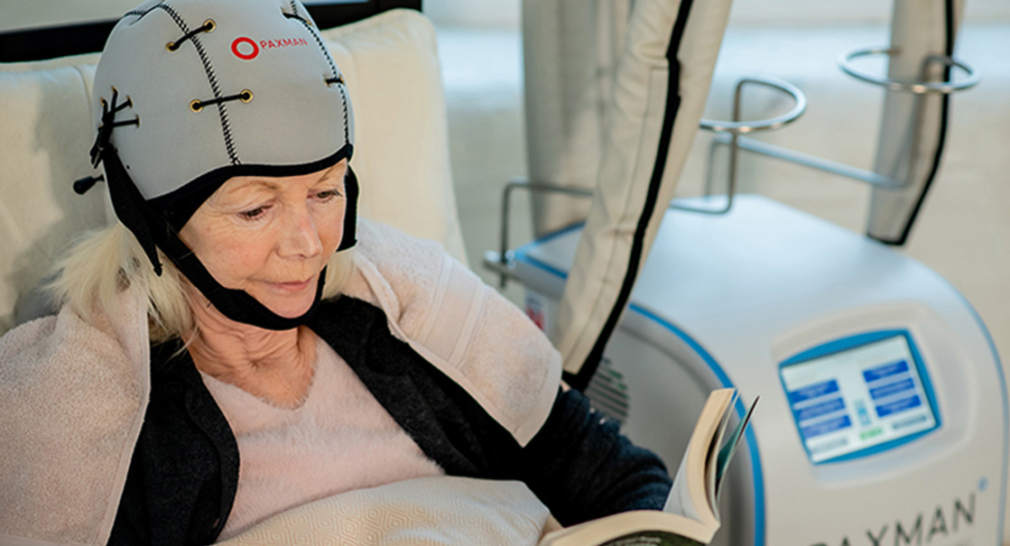Two top-tier cancer technologies, first to the Lower Eastern Shore, help ease patients’ diagnostic and treatment journeys
During an emotionally and physically distressing time in life, there is hope for more convenience, comfort, self-preservation and dignity with two new cancer treatment advances available at Atlantic General Hospital’s John H. ‘Jack’ Burbage, Jr. Regional Cancer Care Center.
For patients facing an excisional breast biopsy or lumpectomy, Merit Medical’s SCOUT wireless breast localization for pinpointing lesions preserves more healthy tissue, increases the likelihood of completely removing a cancerous lesion, and conserves more healthy tissue. The pre-surgical procedure is now available at the Eunice Q. Sorin Women’s Diagnostic Center.
Also, those managing the side effects of chemotherapy can decrease the risk of hair loss with the Paxman Scalp Cooling System, known as cold cap treatment, empowering patients to feel a greater sense of control and privacy. The Burbage Regional Cancer Care Center in Berlin is Delmarva’s first facility to offer a therapy that can encourage acceptance of difficult treatment regimens.
Both advances were funded in part by a $100,000 gift from local businessman and philanthropist Jack Burbage.
“We are invested in making sure we meet your medical needs and emotional needs because we’re in this together, in the community, and we have that extra level of awareness and understanding because we are all one big family here on the Eastern Shore,” says Chanelle Lake, director of the John H. ‘Jack’ Burbage, Jr. Regional Cancer Care Center.
During an emotionally and physically distressing time in life, there is hope for more convenience, comfort, self-preservation and dignity with two new cancer treatment advances available at Atlantic General Hospital’s John H. ‘Jack’ Burbage, Jr. Regional Cancer Care Center.
For patients facing an excisional breast biopsy or lumpectomy, Merit Medical’s SCOUT wireless breast localization for pinpointing lesions preserves more healthy tissue, increases the likelihood of completely removing a cancerous lesion, and conserves more healthy tissue. The pre-surgical procedure is now available at the Eunice Q. Sorin Women’s Diagnostic Center.
Also, those managing the side effects of chemotherapy can decrease the risk of hair loss with the Paxman Scalp Cooling System, known as cold cap treatment, empowering patients to feel a greater sense of control and privacy. The Burbage Regional Cancer Care Center in Berlin is Delmarva’s first facility to offer a therapy that can encourage acceptance of difficult treatment regimens.
Both advances were funded in part by a $100,000 gift from local businessman and philanthropist Jack Burbage.
“We are invested in making sure we meet your medical needs and emotional needs because we’re in this together, in the community, and we have that extra level of awareness and understanding because we are all one big family here on the Eastern Shore,” says Chanelle Lake, director of the John H. ‘Jack’ Burbage, Jr. Regional Cancer Care Center.
SCOUT: Pre-Surgical Accuracy and Convenience
Performing up to 70 breast biopsies and lumpectomies annually with expectations for growth, Alae Zarif, MD, says the SCOUT wireless breast localization technology can significantly improve patient experience. “Anything we can do to reduce the complexity of navigating the myriad steps of the diagnosis and treatment process for individuals with cancer is a good thing,” says Dr. Zarif, a breast surgeon at Atlantic General Hospital and the John H. ‘Jack’ Burbage, Jr. Regional Cancer Care Center.
Before SCOUT, traditional wire localization, like other healthcare facilities in the region provide, required inserting a hooked wire into the breast to mark a lesion’s location. The wire end protrudes from the breast, restricting movement. If displaced, the marker location would be inaccurate and delay surgery. Logistically, the traditional method created some logjams in the operating room (OR).


“This technology has allowed us to reduce surgery time for breast biopsies and lumpectomies,” Dr. Zarif says.
With SCOUT wireless localization, a tiny device smaller than a grain of rice is placed into the abnormal tissue using mammogram or ultrasound imaging guidance. The “reflector” can be placed any time prior to surgery by the radiologist and is activated once it is placed in the breast tissue. Patients can resume normal activity until their surgery date.
During surgery, SCOUT’s 360-degree detection capabilities locate the exact position of the lesion, providing instant response readings to guide the dissection path.
“This technology has allowed us to reduce surgery time for breast biopsies and lumpectomies,” Dr. Zarif says. “It also frees up the ORs and staff to begin other surgery cases that are scheduled for the day, which is a benefit to other patients.”
Importantly, a more precise excision is possible. “This reduces the need to remove additional tissue to ensure a healthy margin,” he says.
Additionally, there’s more peace of mind for patients wondering, “What if the whole lesion wasn’t removed?”
Dr. Zarif says, “The likelihood of having to go back in and remove additional tissue is reduced with this technology. It’s one less thing for patients to worry about during an incredibly difficult time of their lives.”

Scalp Cooling to Curb Hair Loss
Another draining aspect of the cancer journey is facing chemotherapy side effects that serve as a reminder of the disease, including losing hair. Studies show that 10% of cancer patients will refuse chemotherapy or request a less effective treatment to avoid losing a significant portion of their hair, Lake related.
“I have taken care of many women who are concerned about their children’s reaction to their hair loss as a result of treatment,” Lake says. “Hair loss can cause an emotional response, and if you are dealing with cancer and treatment side effects, having the option to use the Paxman may help with the healing process.”
For some, losing hair degrades self-confidence. Others do not want to discuss their condition, and hair loss tells a story they don’t want to share. There are many reasons patients would choose a treatment that decreases the likelihood of alopecia, which usually occurs within two weeks of starting a chemotherapy regimen. Because chemotherapy targets all rapidly dividing cells in the body, hair follicles are attacked — hair is the second-fastest dividing cell.
The Paxman Scalp Cooling System is the only alternative to this devastating side effect.
The science behind it parallels the body’s response when you ice an injury. “The ice restricts blood flow to that area, decreasing swelling and pain,” Lake says.

“Hair has a lot of emotional value and if you are dealing with cancer and treatment side effects, the fact that you have this option helps you with the process of healing.”
By cooling the scalp and restricting blood flow to cells in hair follicles, chemotherapy does not immediately find and attack the once fast-dividing cells. “Having the scalp cooled a few degrees before, during and after chemo restricts blood flow enough that hair follicles are less injured by the chemotherapy,” she says.
Typically, a patient receives a cool cap treatment about 30 minutes to one hour prior to chemo in a clinical setting. The cap stays on during treatment and up to 45 minutes afterward.
There is no guarantee. Most patients experience some level of thinning or shedding, and efficacy depends on the type of chemotherapy. Those receiving Taxane treatments historically experience the least hair loss, Lake says, reporting that 50% to 65% develop Grade 1 Alopecia (on a scale of 1 to 3). “Grade 1 is very mild,” she says.
In a recent clinical trial, 7 out of 8 patients experienced only Grade 1 Alopecia, Lake adds. “That is a wonderful rate that proves efficacy and that this device really works.” CS

